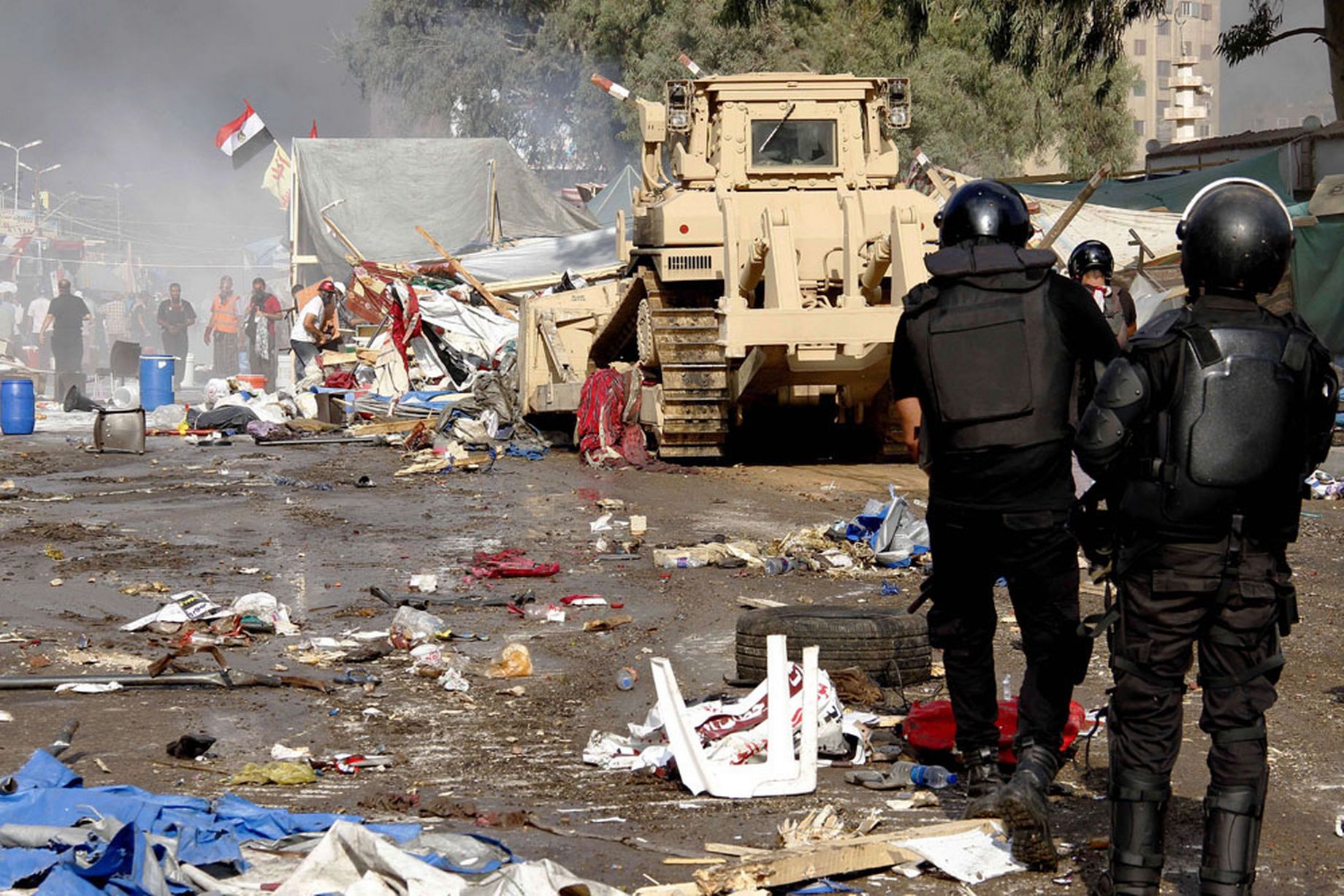Six years ago, on August 14, 2013, Egyptian security forces brutally attacked largely peaceful sit-ins of Muslim Brotherhood supporters protesting against the removal of Mohamed Morsi, Egypt’s first democratically elected president.
In just 12 hours, the state’s use of live ammunition, snipers, armored vehicles, and bulldozers led to the deaths of an estimated 1,000 Egyptians. The smoldering remains of tents, banners, and human debris in Cairo’s Rabaa and Nahda Squares resembled the tragic aftermath of a war.
Human Rights Watch deemed it the worst massacre in modern Egyptian history. More shocking, however, were the reactions of ordinary people within Egypt: many blamed the Brotherhood for bringing this tragedy on themselves.
Why did Egyptians accept, and in some cases, cheer, as the authorities killed and injured their fellow citizens? What role did everyday Egyptians play in demonizing the Muslim Brotherhood? What were the longer-term effects of this spectacular violence on Egyptian political life?
Widespread Acceptance of Violence
The massacres of August 14 were a watershed moment in Egypt’s modern history. This is not just because of the levels of violence employed by the state, but because of the widespread acceptance by Egyptians of this violence.
It stands in sharp contrast to previous reactions to state brutality. Take, for example, the death of young Alexandrian Khaled Said, whose beatings by police sparked nationwide protests culminating in Egypt’s “Arab Spring” in January 2011.
The events of August 14 were the culmination of longer-term processes of demonization of the Muslim Brotherhood. These did not begin with the coming to power of the Muslim Brotherhood after the fall of Hosni Mubarak in 2011 but intensified following the election of Muslim Brotherhood President Morsi in June 2012.
Morsi’s Era
The period between Morsi’s election and his ousting was marked by ongoing opposition and protests, which became increasingly violent over time. There is little doubt that many of the criticisms against Morsi’s rule were warranted.
He pushed through a constitution drafted by a controversial constituent assembly, failed to reach out to the opposition in the face of growing polarization, used Mubarak-era tactics to stifle media criticism, and oversaw ongoing violations by security personnel. He failed to stem hate speech and sectarian attacks against Coptic Christians and other religious minorities and proved unable to present a coherent vision to address Egypt’s economic crisis and demands for social justice.
However, the language used to criticize Morsi and the Brotherhood portrayed them not merely as inept or autocratic but as a fundamental threat to Egyptian identity and values, and even to the Egyptian state itself. The private media, mainly owned by former regime sympathizers, accused the Brotherhood of taking over the country to pursue their own narrow interests, deploying militias, and corrupting the Egyptian character with their “foreign” attitudes towards religion.
Notably though, not all of Morsi’s critics were former regime sympathizers. Independent figures, such as satirist Bassem Youssef, widely known as Egypt’s “Jon Stewart,” also played a role in demonizing Morsi and the Muslim Brotherhood on his widely-viewed show El-Bernameg (The Show).
The program thrived on mocking the Muslim Brotherhood as well as ordinary Egyptians who supported Morsi’s government, accusing the Islamists of being “merchants of religion.” Youssef was certainly no fan of the army and was indeed taken off air for his later criticism of the military but irrespective, his depictions of the Brotherhood played a critical role in rallying support for Morsi’s removal.
Power versus the People?
It was this broader discourse within Egyptian civil society depicting the Muslim Brotherhood as an existential threat that set the stage for massive demonstrations on June 30, 2013. These were reportedly even larger than those that led to the stepping down of Mubarak in 2011.
In turn, these demonstrations provided an opportunity for the military to present itself as responding to the demands of “the people,” thereby justifying the coup against President Morsi on July 3, 2013, and, subsequently the repression of his supporters. In particular, General Abdel Fatah al-Sisi’s July 23 speech, calling on Egyptians to give the military “a mandate to fight terrorism,” and the subsequent mobilization of Egyptians on July 26, provided crucial political cover for the massacres to follow.
The events leading up to August 14 subvert the binary dichotomy so often expressed about authoritarian states: of power versus the people. They reveal the blurred lines between the regime and non-state actors and the power of a shared discourse in fueling hate.
The military and police undoubtedly enjoy great coercive force, but even in authoritarian states, they cannot exercise this with complete disregard for popular sentiment. And perhaps most importantly, authoritarian regimes respond to, as well as shape, wider discourses within society about what security practices might be considered legitimate.
Normalization of Violence
Today, the vast majority of Egyptians still have little sympathy for the Brotherhood. Indeed, fear of a possible return to political life of the Brotherhood is a factor helping to keep the current regime in power. But few can honestly deny that the Rabaa and Nahda massacres did not open the doorway for the normalization of unprecedented levels of state violence and repression, extending well beyond the group: from youth activists to trade unionists and regime critics.
So, this horrific episode not only constituted a turning point in terms of the exceptional levels of violence and their acceptance in Egypt but was also crucial to the crushing of political dissent and other forms of contentious movements.
Today’s anniversary evokes a cautionary tale for Egypt and beyond: when civil society normalizes increasingly extreme language against political rivals, it risks building a wider acceptance of authoritarian power that ultimately leaves no one safe.



